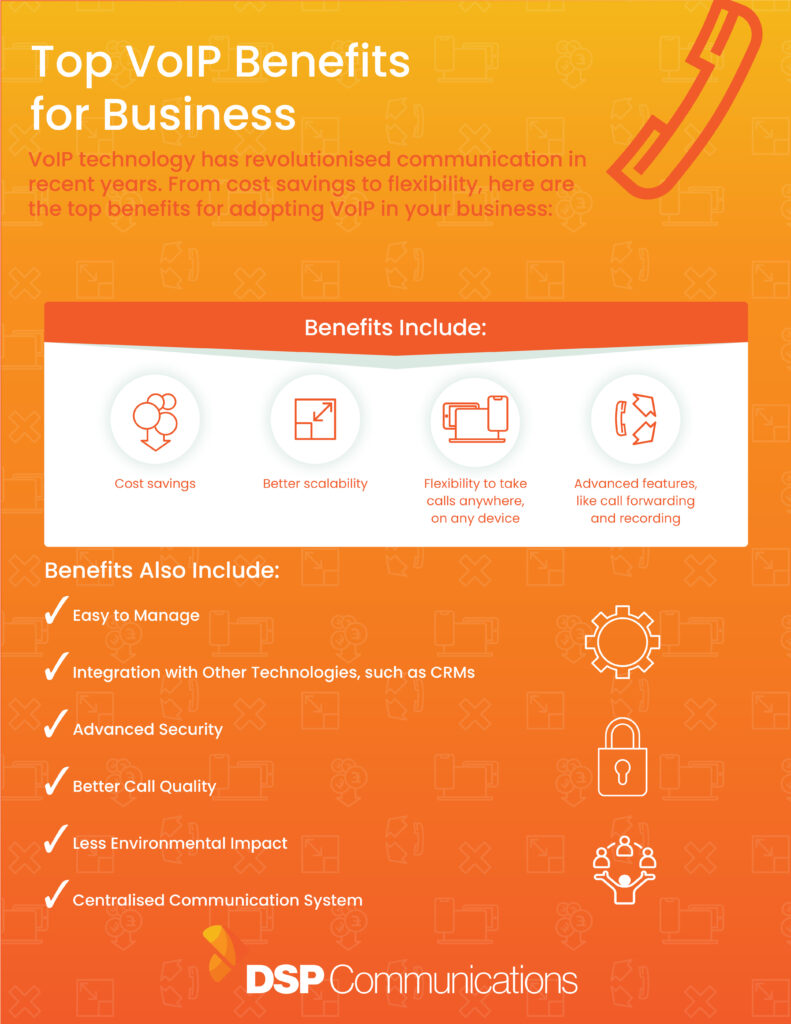Voice over Internet Protocol (VoIP) technology has revolutionised communication in recent years. With its ability to convert voice signals into digital data and transmit them over the internet, VoIP offers a range of advantages for businesses. From cost savings to flexibility, here are the top benefits of adopting VoIP:
1. Cost Savings
One of the biggest advantages of VoIP is the significant reduction in communication costs. Traditional landline services often come with hefty monthly charges, especially for long-distance or international calls. VoIP eliminates the need for expensive phone lines and reduces per-minute charges. For businesses, this can translate into huge savings on communication costs and free or inexpensive calls to anywhere in the world. VoIP also integrates with broadband internet, minimising the need for separate data plans or services.
2. Improved Mobility and Flexibility
VoIP isn’t tied to a specific location or device, which means you can make and receive calls from virtually anywhere with an internet connection. Whether you’re traveling or working from home, VoIP allows you to stay connected to colleagues and clients. This mobility is especially valuable, as employees can use their business phone numbers on mobile devices or laptops, offering a seamless and flexible communication experience.
3. Scalability
VoIP services are highly scalable, making them a perfect solution for businesses of all sizes. As your business grows, it’s easy to add more lines and features to your VoIP system without requiring a major infrastructure overhaul. Adding new users or office locations becomes as simple as installing new phones or configuring software.
4. Enhanced Features
Unlike traditional phone systems, VoIP offers a wealth of features that can enhance your communication experience. Common VoIP features include:
- Voicemail-to-email: Voicemails are sent directly to your email inbox, allowing you to listen to messages at your convenience.
- Call forwarding and call routing: Redirect calls to different devices or team members, ensuring that calls are always answered.
- Video conferencing: Many VoIP providers offer integrated video calls, helping teams collaborate effectively.
- Auto-attendants and interactive voice response (IVR): Businesses can use automated systems to greet and route calls, improving customer service and efficiency.
These features often come standard with VoIP plans, which can be customised to suit specific needs.
5. Better Call Quality
VoIP technology has greatly improved over the years, and modern systems deliver call quality that rivals or even surpasses traditional phone lines. High-definition (HD) audio, low latency, and minimal dropped calls are now commonplace in many VoIP services. VoIP also provides better call quality in areas where cellular or landline services are poor, as long as there is a stable internet connection.
6. Centralised Communication System
VoIP allows for a unified communications system that integrates voice, video and instant messaging in one platform. This reduces the need for multiple tools and systems, streamlining communication and making it easier to manage. VoIP solutions can also integrate with Customer Relationship Management (CRM) systems and other business tools, providing more efficient workflows and enhancing collaboration across teams.
7. Advanced Security
VoIP has the potential to offer more robust security than traditional phone systems. Advanced encryption techniques ensure that calls and data transmitted over the internet are secure from hackers. Additionally, VoIP systems often come with fraud protection, helping businesses avoid costly scams or misuse of services.
8. Integration with Other Technologies
VoIP services can integrate seamlessly with other business technologies, such as CRM software, email systems, and marketing platforms. This makes it easier to track customer interactions, maintain communication logs, and access critical data in real-time. For example, a VoIP system can link up with customer service tools, so representatives can see a customer’s history immediately upon receiving a call.
9. Environmental Impact
VoIP can contribute to sustainability efforts. By eliminating the need for traditional copper phone lines and reducing the need for physical hardware, VoIP systems tend to have a smaller carbon footprint than conventional phone networks. The reduction in paper bills, the ability to use existing internet infrastructure, and the minimal physical equipment required are all positive for the environment.
10. Easy to Manage
VoIP systems are typically easy to set up, manage and maintain, especially when compared to traditional phone systems. Most modern VoIP services offer user-friendly web interfaces for configuring settings, adding users, and monitoring system performance. This makes it easy for businesses to manage their communication systems without requiring specialised IT skills. Service providers often handle the maintenance and updates, reducing the burden on internal teams.
The benefits of VoIP are clear: it offers significant cost savings, flexibility, advanced features, and enhanced scalability. VoIP provides an efficient, cost-effective, and future-proof solution for staying connected. With continuous improvements in technology, VoIP will only become more reliable, accessible, and integrated into our everyday communications. If you haven’t made the switch yet, now is the time to explore the world of VoIP!

